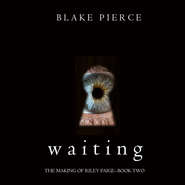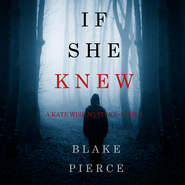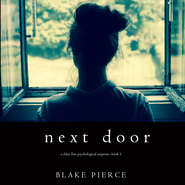По всем вопросам обращайтесь на: info@litportal.ru
(©) 2003-2024.
✖
Cause to Kill
Настройки чтения
Размер шрифта
Высота строк
Поля
Donald Prince had replaced his wife. Older, extremely large and out of shape, he had short gray hair, reddish skin, and a look that spoke to his shock and fury. He wore a dirty T-shirt, shorts, and green clogs. A dirt-covered glove was over one of his hands.
“What the hell do you want?” he said. “Why are you here?” He looked down the street. “You’re not welcome in this house. Haven’t you done enough to our family?”
“I came to get your permission,” she said.
“Permission?” he spit and almost laughed. “You don’t need our permission for anything. We want you out of our lives! You killed our daughter. Don’t you understand that?”
“I never killed your daughter.”
His eyes widened.
“You think that excuses what you did?”
“What I did was wrong,” she said, “and I have to live with that – every day. I’m different now. I’m a cop. I try to right these wrongs, not allow them to go free.”
“Well, good for you.” He aggressively nodded. “Too little, too late for us, though. Isn’t it?”
He tried to close the door.
“Wait,” Avery said.
She held a palm on the painted wood.
“There’s a new killer. Just like Howard Randall. Right in our backyard. He’ll kill again. I’m sure of it. And soon. My leads are cold. I need a fresh perspective. I need to go visit Howard, see if he can help. I want your permission.”
A laugh came from inside.
The door opened.
Donald leaned back, impervious.
“You want my permission?” he said. “To talk to the killer of my daughter, so you can stop another killer?”
“That’s right.”
“Sure,” he said with a fake smile. “Good luck.”
Any familiarity left his face, and a dark, murderous glare penetrated Avery.
“I don’t care who you are now. You hear me? You come to my house again? You talk to my wife?” Violence burned in his eyes. His voice turned into a whisper. “I’ll kill you,” he swore. “And that will be justice. True justice.”
CHAPTER EIGHTEEN
South Bay House of Corrections was a tremendous brown complex that spanned over six square blocks in the South End of Boston. The fortress was laid out in the shape of a triangle, with few windows and even fewer ways to enter. Multiple smaller buildings, high walls, and endless gates around the property made its entrance an enigma to the average visitor.
Avery had been to South Bay a few times before, both as an attorney and a cop. Even though it was easy for her to navigate Massachusetts Avenue to the number of side streets that needed to be utilized in order to park on Bradson Street and gain access to the main building, it was always a time-consuming and overly complicated process.
Visitors normally had to give written permission to enter at least a day in advance. If no advanced warning was given, they were usually turned away at the door for security reasons, regardless of their name, position, or excuse. The fact that Avery was a cop meant little to the overseers at South Bay. Prisons were like private islands, states unto themselves where employees were only accountable to their warden and the major.
Avery, however, wasn’t a typical visitor.
A pseudo-celebrity at South Bay, she was known by nearly everyone on staff. The trial where she had Howard Randall acquitted of murder had been televised. What had also been televised was his bloody surrender only days later. During both ordeals, her face had been plastered everywhere, and until her disappearance and eventual reemergence in the Boston PD, her name had become synonymous with corrupt lawyers and a legal system in need of a massive overhaul.
At the metal detector, a guard shouted.
“Hey, Ms. Black. Check it out, Joey! Look who’s here. Avery Black is back.”
“What’s up, Ms. Black?”
Avery offered a limp wave.
“Hi, guys.”
She placed her items on the table and moved through the scanner.
Another guard bowed.
“To what do we owe this honor, Ms. Black?”
“I’m here to see Howard Randall.”
“Oh!” a bunch of guards cooed.
“Wish I was a fly on that wall,” someone said. “Careful, Black. Randall got moved to B-Block two months ago. He carved up an inmate pretty-bad. That old man can move!”
After the metal detectors, she was frisked and allowed to move into the visitors’ room.
“Name?” said a chubby, dour woman inside a gated office.
“Avery Black. Homicide. Boston PD.”
“I don’t see you on our list, Black. You’ll have to come back another time.”
A passing guard made a face.
“Nah, nah,” he said, “let her through. Do you know who this is? Avery Black. Got that crazy old geezer Randall off for murder. Most riveting case I ever watched.”
“You’ll take the heat?”
“Yeah, yeah. Give her a pass. I’ll get someone down to Randall. See if he’s up for a chat. Sorry, Ms. Black, but if Randall don’t want to see you, there’s nothing we can do.”
“Understood,” she said.
The caged waiting room was large and painted green. Buzzers continually resounded beyond the gates, along with slamming doors. Multiple tables and chairs were occupied by visitors waiting for their chance to see loved ones. A Mexican couple was fighting while their three children ran around and tried to talk to others.
What am I doing here? Avery wondered.
“Black! It’s your lucky day,” the guard called. “Randall said he’s been expecting you. No public visiting room, though. He’s got to stay caged. The moment he opens his mouth, he gets in trouble. I’ll walk you downstairs and set you up outside his cell. More privacy for you too, right? And besides, you were his attorney once. Don’t you have lawyer-client privileges?”
“What the hell do you want?” he said. “Why are you here?” He looked down the street. “You’re not welcome in this house. Haven’t you done enough to our family?”
“I came to get your permission,” she said.
“Permission?” he spit and almost laughed. “You don’t need our permission for anything. We want you out of our lives! You killed our daughter. Don’t you understand that?”
“I never killed your daughter.”
His eyes widened.
“You think that excuses what you did?”
“What I did was wrong,” she said, “and I have to live with that – every day. I’m different now. I’m a cop. I try to right these wrongs, not allow them to go free.”
“Well, good for you.” He aggressively nodded. “Too little, too late for us, though. Isn’t it?”
He tried to close the door.
“Wait,” Avery said.
She held a palm on the painted wood.
“There’s a new killer. Just like Howard Randall. Right in our backyard. He’ll kill again. I’m sure of it. And soon. My leads are cold. I need a fresh perspective. I need to go visit Howard, see if he can help. I want your permission.”
A laugh came from inside.
The door opened.
Donald leaned back, impervious.
“You want my permission?” he said. “To talk to the killer of my daughter, so you can stop another killer?”
“That’s right.”
“Sure,” he said with a fake smile. “Good luck.”
Any familiarity left his face, and a dark, murderous glare penetrated Avery.
“I don’t care who you are now. You hear me? You come to my house again? You talk to my wife?” Violence burned in his eyes. His voice turned into a whisper. “I’ll kill you,” he swore. “And that will be justice. True justice.”
CHAPTER EIGHTEEN
South Bay House of Corrections was a tremendous brown complex that spanned over six square blocks in the South End of Boston. The fortress was laid out in the shape of a triangle, with few windows and even fewer ways to enter. Multiple smaller buildings, high walls, and endless gates around the property made its entrance an enigma to the average visitor.
Avery had been to South Bay a few times before, both as an attorney and a cop. Even though it was easy for her to navigate Massachusetts Avenue to the number of side streets that needed to be utilized in order to park on Bradson Street and gain access to the main building, it was always a time-consuming and overly complicated process.
Visitors normally had to give written permission to enter at least a day in advance. If no advanced warning was given, they were usually turned away at the door for security reasons, regardless of their name, position, or excuse. The fact that Avery was a cop meant little to the overseers at South Bay. Prisons were like private islands, states unto themselves where employees were only accountable to their warden and the major.
Avery, however, wasn’t a typical visitor.
A pseudo-celebrity at South Bay, she was known by nearly everyone on staff. The trial where she had Howard Randall acquitted of murder had been televised. What had also been televised was his bloody surrender only days later. During both ordeals, her face had been plastered everywhere, and until her disappearance and eventual reemergence in the Boston PD, her name had become synonymous with corrupt lawyers and a legal system in need of a massive overhaul.
At the metal detector, a guard shouted.
“Hey, Ms. Black. Check it out, Joey! Look who’s here. Avery Black is back.”
“What’s up, Ms. Black?”
Avery offered a limp wave.
“Hi, guys.”
She placed her items on the table and moved through the scanner.
Another guard bowed.
“To what do we owe this honor, Ms. Black?”
“I’m here to see Howard Randall.”
“Oh!” a bunch of guards cooed.
“Wish I was a fly on that wall,” someone said. “Careful, Black. Randall got moved to B-Block two months ago. He carved up an inmate pretty-bad. That old man can move!”
After the metal detectors, she was frisked and allowed to move into the visitors’ room.
“Name?” said a chubby, dour woman inside a gated office.
“Avery Black. Homicide. Boston PD.”
“I don’t see you on our list, Black. You’ll have to come back another time.”
A passing guard made a face.
“Nah, nah,” he said, “let her through. Do you know who this is? Avery Black. Got that crazy old geezer Randall off for murder. Most riveting case I ever watched.”
“You’ll take the heat?”
“Yeah, yeah. Give her a pass. I’ll get someone down to Randall. See if he’s up for a chat. Sorry, Ms. Black, but if Randall don’t want to see you, there’s nothing we can do.”
“Understood,” she said.
The caged waiting room was large and painted green. Buzzers continually resounded beyond the gates, along with slamming doors. Multiple tables and chairs were occupied by visitors waiting for their chance to see loved ones. A Mexican couple was fighting while their three children ran around and tried to talk to others.
What am I doing here? Avery wondered.
“Black! It’s your lucky day,” the guard called. “Randall said he’s been expecting you. No public visiting room, though. He’s got to stay caged. The moment he opens his mouth, he gets in trouble. I’ll walk you downstairs and set you up outside his cell. More privacy for you too, right? And besides, you were his attorney once. Don’t you have lawyer-client privileges?”

















